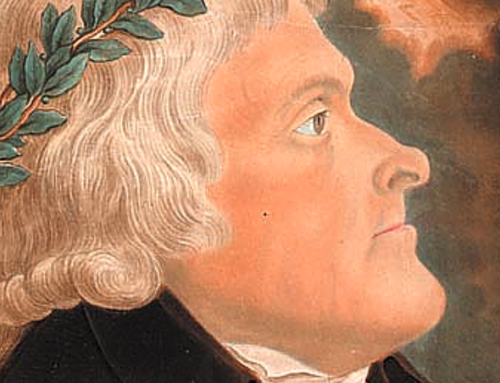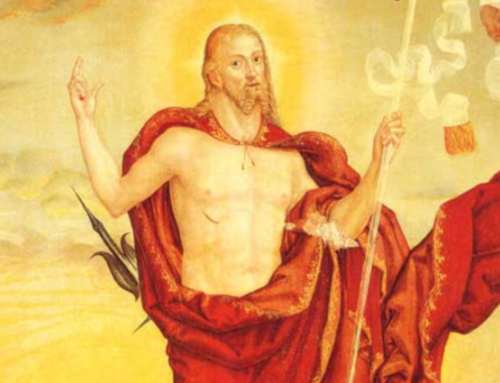Russell Kirk recognized that conservatism most closely honors the way men and women ought to act among their neighbors in community and in matters of transcendent faith. Rooted in the small community, conservatism is homely and humble, and it makes for respectful peace within families and among neighbors. It is brought about by example and persuasion, not by sloganeering and shouting down.
 During the mid-1950s, Russell Kirk was a very busy man: writing, debating, travelling, advising, working hard to found a new conservative quarterly, and in general becoming a force to be reckoned with in the world of American cultural thought. He and other thoughtful men and women were laboring to reinvigorate a respectable conservative tradition in these United States. Their efforts were not always met with joy by some who wanted a political program outlined or for conservative spokesmen to steamroll their opposition. Interestingly, some of Kirk’s harshest critics were men and women of the right.
During the mid-1950s, Russell Kirk was a very busy man: writing, debating, travelling, advising, working hard to found a new conservative quarterly, and in general becoming a force to be reckoned with in the world of American cultural thought. He and other thoughtful men and women were laboring to reinvigorate a respectable conservative tradition in these United States. Their efforts were not always met with joy by some who wanted a political program outlined or for conservative spokesmen to steamroll their opposition. Interestingly, some of Kirk’s harshest critics were men and women of the right.
The July, 1955 issue of The Freeman contained the following brief remark in the editor’s introductory overview of the issue: “Recently, the Harvard Conservative Club staged a ‘debate’ between Dr. Russell Kirk and Dr. Arthur Schlesinger, Jr. In the question and answer period, a student voiced this protest: ‘I came here to hear a debate between a conservative and a liberal, and all I got was an argument between a conservative liberal and a liberal liberal.’ ”
What this young man wanted was a verbal brawl, perhaps with shouting and cutting remarks that would leave one or the other participants wounded and angry—and most importantly, defeated and trampled.
Indeed, Russell Kirk’s writings have never appealed to people who want all or nothing, who want an instant conservative revival complete with a well-designed, well-executed strategy for political victory, instant cultural harmony, an end to dissent, an end of discussion on matters of the role of religion in the public square, and the inauguration of something like a secular heaven on earth. People who desire such a scenario are called ideologues, and Kirk had nothing to do with ideology. He held with Old John Adams that ideology is “the science of Idiocy.” There is a difference between ideology and philosophy.
“Philosophy” translates to “love of knowledge,” and to love knowledge, it must be pursued and embraced.
Kirk recognized that conservatism is a philosophy or a way of looking at life that makes for a manner of belief and of action that most closely honors the way men and women ought to act among their neighbors in community and in matters of transcendent faith. Conservatism is certainly not a program, a campaign, or a career choice. Rooted in the small community, it is homely and humble and it makes for respectful peace within families, between neighbors, and ultimately among nations. It looks to the past, to be sure, but only to more clearly see the way through to tomorrow. It is brought about by example and persuasion, not by sloganeering and shouting down.
An example from Kirk’s life might illustrate.
During his high school days, Kirk was a member of the debate team at Plymouth High School. In fact, he rose to become captain of the debate team, which was the best in all Michigan. One day the team traveled upstate from Plymouth by train to compete in the state championship, which Plymouth won. On the evening that the team returned home, a large contingent of parents, friends, and townsfolk turned out on the platform to welcome the train as it pulled into Plymouth Station, cheering the team loudly as they disembarked. Not the basketball team. Not the football team. The debating team. It was a different time, wasn’t it? But not so different from our own that we cannot learn from it.
Then as now, the purpose of debate is to convince, to persuade. When it is all over, you want to have converted the judges, the audience, and perhaps some members of the opposing team to your way of thinking, not have your opponent transformed into your sullen enemy, quietly planning his revenge against you.
As anyone who has read The Conservative Mind knows, Russell Kirk revered the legacy of John Adams. Early in his book, Kirk paraphrased Adams in defining a member of the natural aristocracy as anyone who has the power to influence at least one vote other than his own. Balance that with Kirk’s famous remark that “The conservative is concerned, first of all, with the regeneration of the spirit and character—with the perennial problem of the inner order of the soul, the restoration of the ethical understanding, and the religious sanction upon which any life worth living is founded.”
If these statements are true—and there is every reason to believe they are—then the large, loose amalgam of people who describe themselves as American conservatives have some rebuilding to do.
Why? My own perspective is that conservatism took an odd but predictable turn after its initial successes on the political stage during the 1980s. With liberalism widely seen as false and ineffectual, suddenly it seemed that every other person was calling him- or herself a conservative. Even people formerly of the left began jumping on the bandwagon and calling themselves “neo-conservatives.” Amid it all there arose a form of conservatism (so-called) that was loud, tough-talking, arrogant, internationalist, interventionist, aggressively militaristic, big on flag-waving and small on thinking.
A few weeks ago, for a blessedly short time, I watched C-SPAN’s coverage of the goings-on at CPAC. Much of what I heard is commonly called “red meat” for the true believers—but for goodness sake, the television cameras were rolling and this program was being broadcast throughout the nation. There is a time for everything: a time to tell uproarious jokes, and a time to be more thoughtful and reserved. There is no need to stupidly provide fodder for Jon Stewart or Stephen Colbert.
Seriously, after listening to one CPAC speaker after another hurl insults and inside jokes at the expense of everyone not deemed sufficiently conservative, would any neutral observer really want to consider a conservative mindset as an alternative to whatever he or she already believes? More likely they will be thinking, “My Lord, I am sure glad I am not one of them.” My point is not that conservatism is not a large enough tent. It is that what’s going on inside the tent often does not make anyone want to come inside and at least take a look at what’s going on.
A little over 20 years ago, in October, 1993, Russell Kirk was honored at a two-day event at the Dearborn Inn on the occasion of the fortieth anniversary of the publication of The Conservative Mind. As they say, everybody who was anybody was there, with a few exceptions. With Kirk standing in the room listening, one distinguished figure who attended this event introduced a roundtable discussion with a little joke. He said, “First I need to dispel at least one of the illusions some of you may harbor about the man we’ve come to honor. It’s something that may surprise you, may shock you, may fill you with horror, but it must be said. Everyone had better take a deep breath. I’ll have you know that Russell Kirk had the heart of a liberal. . . .He kept it in a jar on his desk.”
This was intended for the consumption of just us: Russell Kirk and a few hundred of his closest friends. If the event had been televised, the man would probably not have told that joke—because everyone knew Russell Kirk was not a fire-breathing hater of liberals.
Kirk was aligned with Burke in his belief that culture and the civil social order are organic, like a tree. It grows, it flourishes, and eventually it dies. And we hasten its death by bathing its roots in poison: the poison of unbelief, haughty disdain for the past, social atomism, rejection of the mores that make life bearable, a thought-free sneering disdain for viewpoints other than one’s own, and other maladies. A veneer of appearances can be maintained for a long stretch of time, but eventually the barbarians come over the wall and it all ends quickly, and suddenly we are in a world not terribly different from The Walking Dead, with which every man’s hand is against his neighbor. (Interestingly, that seems to have been one of the understated themes of the most recent season of The Walking Dead: Once civilization has collapsed and the culture that sustained it has fragmented, is it possible to come back?)
To turn to politics: Shortly after the results of the 2008 presidential election were finalized, I read something remarkable on a conservative website devoted to motion pictures. In the midst of all manner of sullen, sour-grape remarks about how the Republicans had strategized poorly, or how the GOP had picked a weak candidate, or how the media was biased, or how Barack Obama had cheated to win the election, one writer, Leo Grin, rightly said that Obama is “not responsible for Republicans getting their lunch handed to them this time out, he is just the one on the other side who managed to best take advantage of the malaise and betrayals which our own leaders have inflicted upon us. In 2004 we gave Republicans a wide, powerful mandate for conservative governance, and they proceeded to squander that precious capital perfidy by heartbreaking perfidy.
“The coming years are going to require clear thinking grounded in solid conservative principles, not snapping and yapping like rabid curs. The Republican brand is currently at junk status. People who have voted for them and supported them their entire lives—millions of us—absolutely do not place any trust or faith in what they say anymore. We no longer believe the promises, buy the explanations, or credit the professed election-cycle Road-to-Damascus conversions. At every turn we cringe and jump, expecting our own side to steal our wallets or stick a knife in our backs or humiliate us with scandal. For that to change, Republicans are going to have to find leaders with the courage to vote staunchly conservative, the intellectual capacity to compellingly and congruently explain their reasons for doing so, and the charisma to make their stands palatable even to many voters on the other side of the aisle. We need people who put conservatism before careerism and cronyism, who do not become deer in the headlights every time their Teleprompters are turned off, and who do not meekly accept the liberal prevailing wisdom but endeavor to change it.”
Here is the money-quote: “Successful political coalitions are built by a continuous wresting of slivers of the electorate from the other side via a galvanizing, superior worldview—by making new friends and convincing them that it is in their interests for your causes to become their own. They are manifestly not built by declarations of everlasting hatred towards the legitimate winners of an election and the half of the country who voted them into office. If we let the howling bitter-enders of this election set the tone for the party going forward, God help us.”
That is true enough for the world of politics, and its essence is true for how we affect our culture at large. For culture eats strategy all day long. Nobody is going to consider rethinking their progressive credentials by being shouted down, denounced as an idiot, or otherwise sniffed at as being a hopeless case. People are won over more by persuasion than by insults, by thoughtful correction rather than by dismissal.
“American problems . . . are grave enough, without malicious misrepresentation from any quarter,” wrote Kirk in one of his better-known essays, back when Communism was considered a major threat. He continued, “We cannot afford the venomous political fantastic in this time of troubles; we cannot afford even the silly, well-meaning political ignoramus. To act intelligently, the conservative interest in this country must free itself from even the peripheral influence of intellectual freaks like Ayn Rand, from profiteers who thrive upon confusion and hatred, and from the absurd simplifiers who fancy that calling everyone in Washington a Communist will make all things hunky-dory. . . . To set one’s face resolutely against the Communist domination is one thing; to cry havoc at every breath of liberal or radical opinion is quite another.” (“Conservatives and Fantastics”, America 106, 17 February 1962)
And in an open letter written to Robert Welch, president of the John Birch Society, Russell Kirk stated: “Cry wolf often enough and everyone takes you for an imbecile or a knave, when after all there are wolves in this world.” (National Review, 13 February 1962)
And Kirk’s friend Wendell Berry once wrote, “There certainly is a prevalent loss of trust operating in this society now, and if you have enough people who do not think they can trust each other, you have got some serious problems. There is a famous crisis of confidence in government; a lot of people think it’s useless to vote. If we can not trust each other to do what we have said we will do, cooperation is impossible.
“Cooperation means working together. If you can not work together, you can not have a community.”
Community was important—essential to the mind of Russell Kirk—and the restoration of the small community and its connectedness with other small communities through the inculcation of spirit and character is the true challenge of the conservative mind during the next decade of this century. To bring this about is going to call for all the wisdom, the character, the boldness, and the active imagination possessed by the rising generation.
One last anecdote, please. When I graduated from university in the late 1970s, our commencement speaker was the then-Vice President of the United States, Walter Mondale. You would think a dyed-in-the-wool liberal like Mondale would be greeted with enthusiastic welcome by the academic community in Ann Arbor, Michigan, but such was not the case. When Mondale arose to give his address, he was recurrently shouted down by a small number of chanting protesters, who recurrently succeeded in bringing the proceedings to a complete standstill. The packed venue, Crisler Arena, seated roughly 14,000 people. Do you know how many protesters succeeded in dominating the commencement (before they were eventually shown to the exits by Security)? Six. If six malcontents can bring a university’s packed commencement exercises to a complete standstill and leave everyone present with a bad taste in their mouths, imagine the positive effect a small number of thoughtful, well-spoken, exemplary bearers of the moral imagination can have upon a town, a city, a culture. The fun will be in the trying. Let’s have fun doing it together. Thank you.
This essay is based on remarks delivered at the Seminar on Contemporary Conservatism Here and Abroad, held at the Russell Kirk Center for Cultural Renewal.
The Imaginative Conservative applies the principle of appreciation to the discussion of culture and politics—we approach dialogue with magnanimity rather than with mere civility. Will you help us remain a refreshing oasis in the increasingly contentious arena of modern discourse? Please consider donating now.
The featured image is courtesy of Pixabay.







Leave A Comment